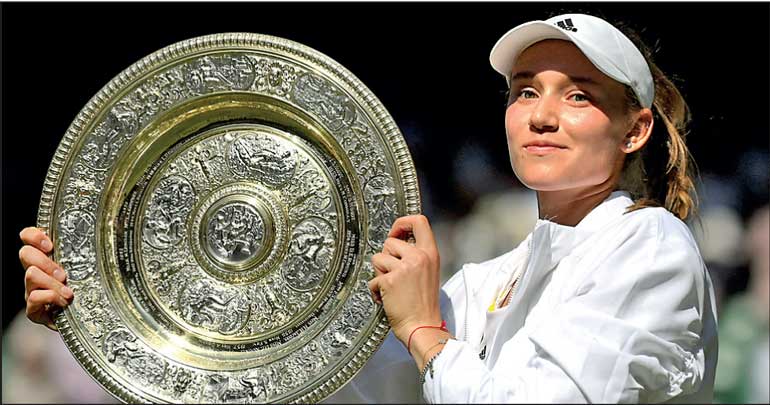Tuesday Jul 01, 2025
Tuesday Jul 01, 2025
Monday, 11 July 2022 00:00 - - {{hitsCtrl.values.hits}}

Kazakhstan’s Elena Rybakina poses with the Wimbledon trophy after winning the women’s singles final against Tunisia’s Ons Jabeur – REUTERS
LONDON (Reuters): Elena Rybakina’s modest celebrations after winning Wimbledon on Saturday was mostly due to her impassive personality but there was possibly also an air of inevitability about her triumph that made her react the way she did.
Rybakina was only 20 when her career graph went on an upward trajectory around the start of the 2020 season as she lifted a second WTA title in Hobart and also reached the finals in Shenzhen, St. Petersburg and Dubai.
She broke into the top 20 of the women’s world rankings in February 2020, but saw her progress stymied due to a thigh injury before the COVID-19 pandemic forced the suspension of the tennis season.
The Moscow-born player, who shifted allegiance to Kazakhstan four years back, reached her maiden Grand Slam quarter-finals at the French Open last year before making the fourth round at the manicured lawns of the All England Club. So, what changed between being another youngster with massive potential to becoming a Grand Slam champion? “The last three years I think I’m top 20,” Rybakina, who reached a career-high ranking of 12 in January, told a small group of reporters late on Saturday during her countless rounds of media obligations.
“And I had very good matches, great battles, against great champions, and it was always close.
“In those close moments I was the one who will lose the serve or just miss. Maybe it mentally clicked (this time). I believed in myself more in this tournament and in the crucial moments I was just solid enough to win.” After 21-year-old Iga Swiatek’s success at Roland Garros last month and the world number one Pole’s strong run this season, Rybakina felt there was a change of generation in women’s tennis and the younger players were taking charge.
Discover Kapruka, the leading online shopping platform in Sri Lanka, where you can conveniently send Gifts and Flowers to your loved ones for any event including Valentine ’s Day. Explore a wide range of popular Shopping Categories on Kapruka, including Toys, Groceries, Electronics, Birthday Cakes, Fruits, Chocolates, Flower Bouquets, Clothing, Watches, Lingerie, Gift Sets and Jewellery. Also if you’re interested in selling with Kapruka, Partner Central by Kapruka is the best solution to start with. Moreover, through Kapruka Global Shop, you can also enjoy the convenience of purchasing products from renowned platforms like Amazon and eBay and have them delivered to Sri Lanka.
Discover Kapruka, the leading online shopping platform in Sri Lanka, where you can conveniently send Gifts and Flowers to your loved ones for any event including Valentine ’s Day. Explore a wide range of popular Shopping Categories on Kapruka, including Toys, Groceries, Electronics, Birthday Cakes, Fruits, Chocolates, Flower Bouquets, Clothing, Watches, Lingerie, Gift Sets and Jewellery. Also if you’re interested in selling with Kapruka, Partner Central by Kapruka is the best solution to start with. Moreover, through Kapruka Global Shop, you can also enjoy the convenience of purchasing products from renowned platforms like Amazon and eBay and have them delivered to Sri Lanka.